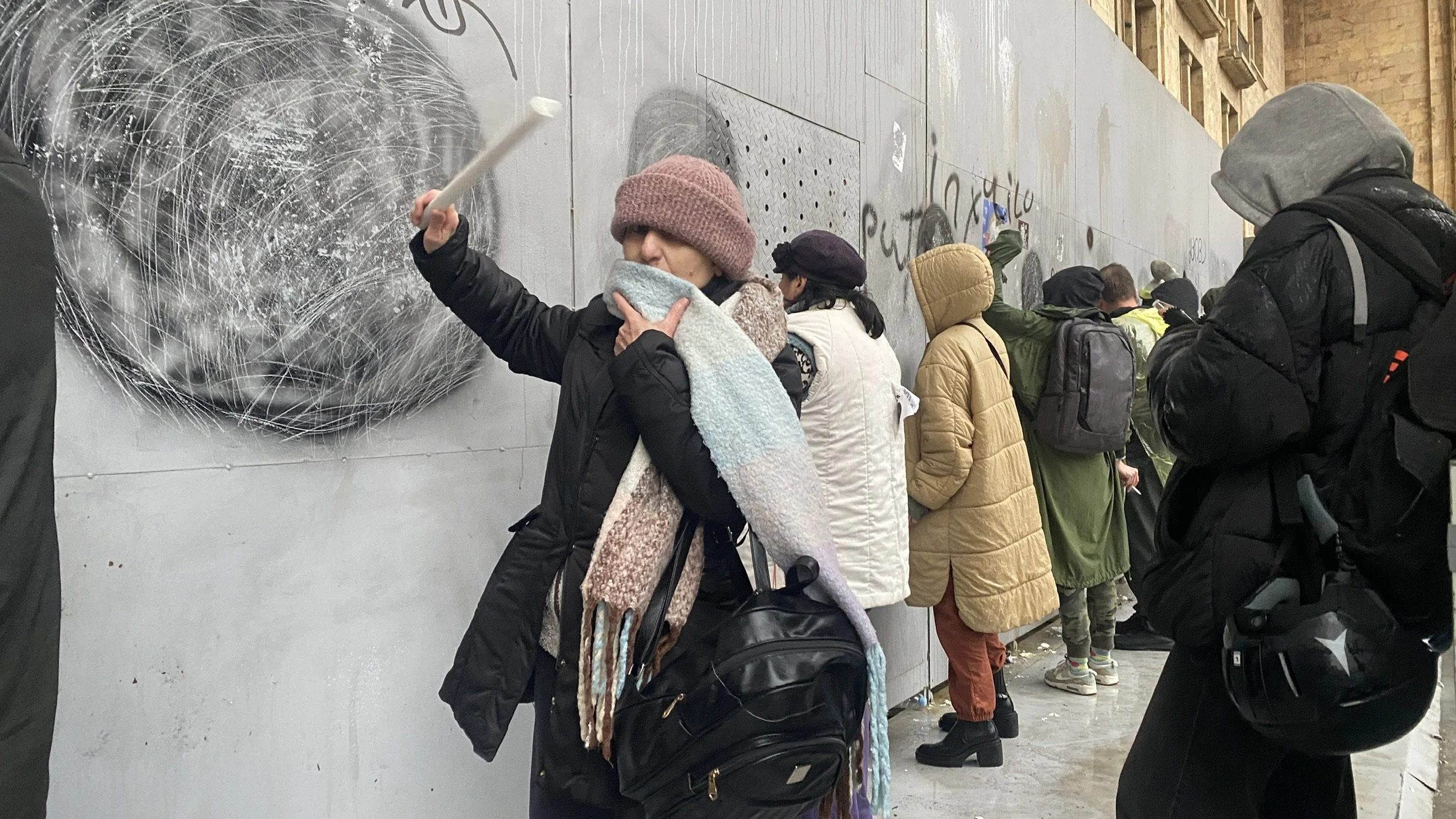Unrest Surges as Georgia’s Parliament Holds First Session
A woman scolds police officers for being tools of Russia as they guard the side entrance to Parliament.
11/26/24
By: Daniel Miller
The music from the towering loudspeakers set up in front of Georgia’s parliament building could be heard just a few seconds after exiting the metro station after walking up a slight incline. They were set up by the coalition of political parties known as the United National Movement (UNM), who are demanding a new round of parliamentary elections after widespread allegations of voter intimidation and ballot stuffing, and claims of irregularities. One incident of ballot stuffing was caught on camera, but that was not enough for a Tbilisi judge with close ties to the ruling Georgian Dream (GD) party, who ruled against that and ten other lawsuits filed by the UNM.
Russian President Vladimir Putin and Hungarian Prime Minister Viktor Orbán have so far been the only two world leaders who have recognized the legitimacy of the election results, with both quickly doing so on election night. Every elected member from the opposition has vowed to abstain from all parliamentary sessions so as not to lend legitimacy to GD, and President Salome Zourabichvili promised not to honor the results.
Weeks of intermittent protests have taken place in response to these allegations since the election on October 26th. Many have occurred in the form of marches around town as crowds block traffic through the city for hours so they can send a message to the ruling party that disruptions will continue if their demands for free and fair elections are not met. On Sunday afternoon, November 24th, multiple groups of protesters formed in different areas around the city and made their way towards the parliament building, holding up traffic along the way. They eventually arrived, promising to camp overnight so as not to miss an opportunity to give arriving members of GD a warm welcome.
I left Parliament late that night with the intention of arriving again early the next morning. This was the scene as I walked closer to the metro station:
While many were determined to stay up all night, others chose to take short naps on bean bag chairs when they could. Blankets were available for a small fee. Groups of people huddled around small fires on the street. This was the vibe until members of the GD started showing up late, at around 10:30. That’s when the music stopped and the crowd’s energy started to change, which is why hundreds of special forces started mobilizing behind hundreds of police officers.
There were many more in the back, including those who like to cosplay as comic book soldiers:
Two hours later, the crowd moved from the side of Parliament to the front and started banging on the metal barriers with rocks and rods while others threw food and assorted objects.
The cops and special forces officers seemed a bit confused about what to do next, as they stood there, dumbfounded. They eventually left instead of trying to disperse the protesters at the entrance.
To further disrupt the session, a Georgian audio recording of a woman addressing the Georgian Dream as “Russian slaves” played at full volume over the loudspeakers set up out front. The crowd jeered during the parliamentary session as certain Georgian Dream members were shown on the broadcast over the big screen.
As the rainfall increased and the parliamentary session ended, the crowd eventually withered down to a handful of people by that evening, with traffic having resumed back to normal. It remains to be seen what will happen next. It’s quite possible that GD Prime Minister Irakli Kobakhidze is attempting to play the same game as Serbian President Aleksandar Vučić, who has done a surprisingly decent job at appealing to the West while continuing to appease Russia, and strengthening the economy while doing so. The bargaining chips that Russia used to hold in the form of controlling natural gas supplies and trade routes have since been placed in the hands of Georgia as of a few years ago, both of which are significant factors from which the Western and several powers stand to benefit.
It’s also quite possible (and likely) that billionaire banker Bidzina Ivanishvili, the de facto ruler of GD who made most of his fortune in Russia during the 1990s when it was a gangster-controlled failed state, is seeking to continue Georgia’s democratic backsliding and placate his autocratic friend in Moscow. GD will continue helping Russia evade global sanctions through smuggling in the breakaway regions of Abkhazia and South Ossetia and their hopes of joining the European Union have been stalled. Any hope of joining NATO is years away.
Although Georgia is small, it carries huge significance in the game of geopolitics. I think for now, GD is relying on fatigue and disillusionment as a tool to quell the protests in hopes that they will eventually fade away. If the Georgian people want new elections – if they truly want structural change – they need to remain tenacious, focused, and, most importantly, organized. The Revolution of Dignity in Ukraine occurred over the course of three months. The uphill battle for democracy and human rights continues. Let’s hope the Georgian people get what they deserve.
Vladimir Putin on the left, Bidzina Ivanishvili on the right.
If you enjoyed this article, please consider supporting me on Patreon. I am completely independent and my journalism is often inhibited simply by a lack of funding. A little bit really does go a long way. Thank you!




